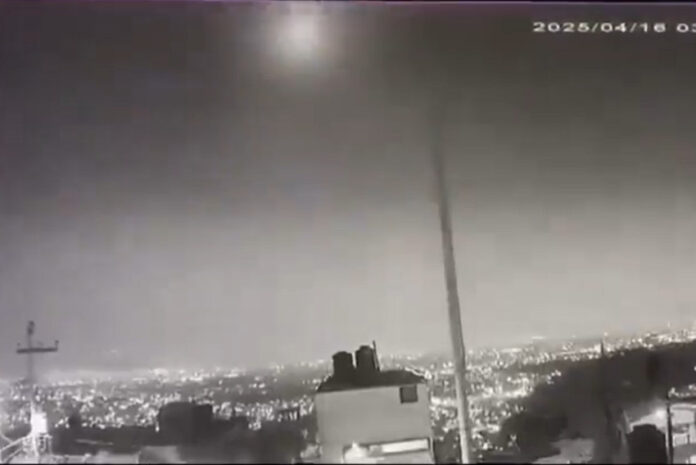Residents of Mexico City and other areas in central Mexico were jolted awake early Wednesday by a loud explosion and a bright flash across the sky.
The event was later confirmed by monitoring services as a bolide — an exceptionally bright meteor that explodes in Earth’s atmosphere.
¡Impresionante avistamiento en el cielo!
☄️💥 Esta madrugada, en el centro del país, se registró un fuerte sonido similar a una explosión cerca de las 04:51 horas.Cámaras de seguridad y Webcams de México captaron el paso de lo que se considera un meteorito a las 03:47:06. pic.twitter.com/0KRHH04pU1
— Bóveda Informativa (@bovedainfo) April 16, 2025
The phenomenon occurred at approximately 3:49 a.m. local time today, sparking widespread social media buzz but no immediate reports of damage, injuries, debris or impact sites.
The independent seismic monitoring service Sismo Alerta Mexicana detected the explosion’s acoustic wave via seismographs, affirming on social media it originated from a bolide that exploded an estimated 12 to 25 miles above the Earth’s surface.
“Based on reports and our cameras, we confirm that the explosion in Mexico City was a bolide (possibly a meteorite or meteor) that exploded 20-40 km above the ground, creating an acoustic wave,” the group stated on X.
As of midday Wednesday, Mexico’s Civil Protection agency and government agencies had yet to issue official statements.
Though people in Mexico City reported vibrations, Mexico’s National Seismological Service did not record earthquake activity.
The sound, delayed by its travel time from the high-altitude blast, was heard across the city and other regions in the CDMX metropolitan area, including Ecatepec and Cuautitlán Izcalli.
Video footage shows the bright object streaking across the sky before the explosion, with some witnesses seeing the phenomenon in Querétaro and Pachuca, approximately 185 and 88 kilometers from CDMX, respectively.
Social media reports describe the event as a powerful explosion that caused vibrations, rattled windows and triggered car alarms.
Videos from security cameras and Webcams de México captured the fireball’s streak, described by at least one witness as a “giant shooting star.”
Daniel Flores, a researcher at the National Autonomous University of Mexico (UNAM) Astronomy Institute, told the media that bolides are space rocks that vaporize due to atmospheric friction, unlike meteorites, which reach Earth’s surface. “These objects heat up intensely, creating light and sound, but most disintegrate harmlessly,” he said.
Experts emphasized that such events are common globally, with an estimated 17,000 bolides entering Earth’s atmosphere annually, though few are noticed.
The incident brings to mind a “supposed” meteorite strike in Tamaulipas in 2020 and a meteor explosion in Russia equivalent to 500 kilotons of TNT that caused widespread damage and injuries in 2013 — focusing attention on the need to monitor near-Earth objects (NEOs) and develop early warning systems.
Mexico happens to be the home of the seventh-largest meteor ever found on Earth, the Bacubirito meteorite, which weighs 20 to 22 tonnes; it’s also the third largest in the Americas and, at 4.25 meters, the longest meteor ever found. Discovered in 1863 by a farmer near the town of Bacubirito, Sinaloa, it is housed at the Sinaloa Science Center.
Mexico’s fascination with meteors can also be experienced at the Museo del Meteorito, or the Meteorite Museum, which opened in 2022 in Progreso, Yucatán.
With reports from Infobae, Milenio, N+ and Noticias Activas
